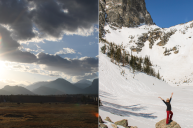When picturing hiking, many people imagine a large-scale fitness endeavor. They imagine a person covered in gear and equipment, booking it up some steep slope at top speed. Although this is true for some hikers, speed is unnecessary for a good hike. In fact, there are many benefits to being a slow hiker. So before you limber up for a race up the mountain, check out these reasons why you should consider being a slow hiker.
No Need To Be Ashamed of Being the Slow Hiker

Getty Images, South_agency
Often, hiking can feel like a competition. It is a race to see who can get to the end of the trail the quickest and with most of their breath still intact. However, that does not have to be the case. If you are the slow hiker of your group, remember that there are benefits to not being at the front of the pack.
Being a slow hiker and being at the end of the hiking group offers many benefits; we discuss some of them below.
1. Appreciation For Nature

Getty Images, stockstudiox
Most people do not get into hiking because they are passionate about beating record trail times. The average person gets into hiking because they deeply appreciate nature. If you book it through the trail, you care more about your time than your beautiful surroundings. Being a slower hiker gives you ample time to take in your incredible surroundings' sights, smells, and sounds. There have even been studies that have proven that exposure to nature "led to improvements in attention, positive emotions, and the ability to reflect on a life on a life problem." The hike is good for your body, but taking the time to appreciate nature is good for your mind.
2. You Tackle The Perfectionism Bug

Photo by Sean Gallup/Getty Images
Too often, hikers focus on the destination rather than the journey. They place so much emphasis on reaching their destination by a specific time that it becomes all-consuming. If they do not reach that goal like they set out to, it can be devastating. Their focus becomes on being the "perfect hiker" and out-hiking all of those around them.
However, this defeats the purpose of a hike. A hike is a great way to get some physical exercise and relax the mind. If you go into it with this perfectionist mindset, you take the relaxation out of it. Harvard Summer School mentions how perfectionism can harm the body and mind. They explain that perfectionism can cause "a lot of stress, worry, and anxiety because of fear of failure."
While those are not fun to deal with in general, they also have long-lasting effects. They claim, "multiple studies have found connections between perfectionism and depression, anxiety disorders, obsessive-compulsive disorder, and eating disorders." So do yourself a favor, be the slow hiker, and focus on the journey, not the destination. After all, you have to hike your own hike. You go on the journey for yourself, not for anyone else.
3. Less Prone To Injuries

Getty Images, Bombucreative
While it is true that slow hikers may not reach certain points on the trail, they are also less likely to injure themselves. Slower Hiking mentions that most errors and accidents that occur on hikes are due to human error rather than gear and equipment. They state, "Serious mishaps often occur not due to a low skill level, experience, or knowledge level, but because we are attempting to operate beyond them."
If you are pushing yourself too hard or too fast, you are more likely to become fatigued. Once fatigued, you are more likely to suffer from an injury. Sprains and strains are some of the most common injuries that occur on hikes. A bad injury can end not only the hike you are currently on but future hikes as well.
So, take the slower route. Pace yourself, go in with a plan, and come out in one piece.
How To Be A Slow Hiker

Getty Images, Viktor Cvetkovic
Now that you are convinced that being a slow hiker may actually be good for you, you may wonder how to be a slow hiker. Whether it is your first time or you are a slow hiker in training, Backpack offers some great tips on how to be a slow hiker. A summary of those tips can be found below.
- Be nice to yourself: Pivot away from negative self-talk and tell yourself that the slow pace is fine.
- Fake it 'til you make it: If you don't love your slower pace, pretend that you do anyway!
- Set expectations: If you are going with a group inform them that you want to be a slow hiker, and maybe leave early to account for extra time needed.
- Give up on FOMO: Don't worry about missing the conversations of the faster hikers; instead, focus on that beautiful nature we discussed.
- Ask to set the pace: If you're going with a group, ask to lead and have the group follow your pace.
- Bring a newbie: New hikers are often slow hikers, so bringing a new friend along can give you someone at the same pace and give you a chance to mentor them.
- Be safe: You are taking the time to be a slow hiker, so also take the time to check the weather and other important factors that affect the safety of your hike.




